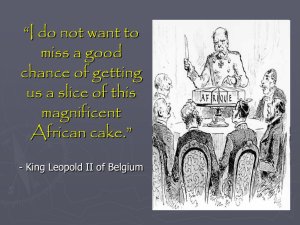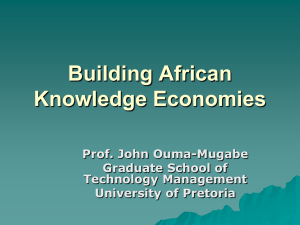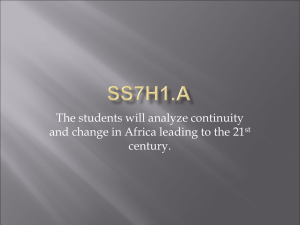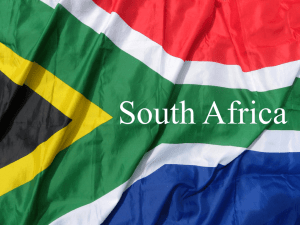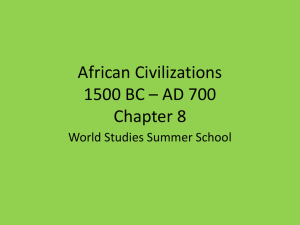File - Ms. Cherry`s Homework Page
advertisement
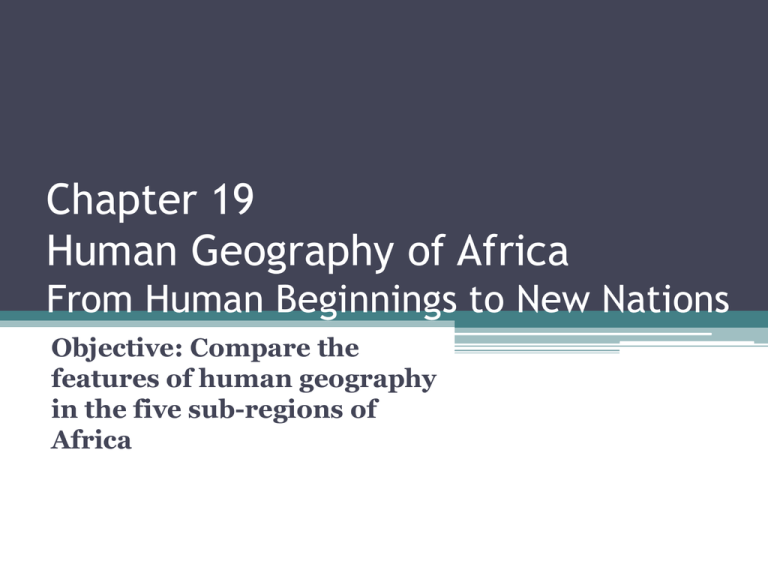
Chapter 19 Human Geography of Africa From Human Beginnings to New Nations Objective: Compare the features of human geography in the five sub-regions of Africa Chapter 19 Section 1 East Africa Vocabulary: Olduvai Gorge, Aksum, Berlin Conference, Cash Crop, Masai, & Pandemic Objective: Analyze East Africa’s economies of farming & tourism Continental Crossroads • East Africa has a large number of prehistoric human remains • Aksum emerged in Ethiopia in 100 A.D. • The Aksum civilization traded with Egypt & the Roman Empire • Several factors led to their decline including geographic factors • In the 1300s, many trading cities emerged along the eastern coast of Africa Colonization Disrupts Africa • 14 European nations convened at the Berlin Conference to divide Africa • By 1914, only Liberia & Ethiopia remained free of European control • European nations divided Africa without regard to where African ethnic or linguistic groups lived • Ethiopia was able to escape colonization because of their knowledge of the area’s geography & weapons from France & Russia • Internal disputes & civil wars sparked after most of East Africa regained independence Farming & Tourism Economies • East Africa is more than 70% rural • European colonization relied more on cash crops such as coffee, tea, & sugar • People are leaving farms for greater economic opportunities in cities • The vast wildlife parks in East Africa draw tourist to the region • The parks are located in Kenya, Uganda, & Tanzania Maintaining Traditional Cultures • The two major ethnic groups in East Africa are the Masai & the Kikuyu • The Masai mostly herd livestock & farm the land • They wear calfskin or buffalo hide • They are known for making intricate beadwork & jewelry • The Kikuyu mostly live in Kenya • They also are herders but work in a variety of jobs more recently Health Care in Modern Africa • People in East Africa face many health care problems • AIDS has become a pandemic (uncontrollable outbreak of a disease affecting a large population over a wide geographic area) • Many doctors in Africa say that more AIDS cases exist than are reported Chapter 19 Section 2 North Africa Vocabulary: Carthage, Islam, & Rai Objective: Examine roots of civilization in North Africa Roots of Civilization in North Africa • North Africa is a cultural hearth (a place where ideas & innovations come together to change a region) • The Nile River made civilization possible in Egypt • Ancient Egypt lasted for 2600 years with 30 dynasties • Egyptians were known for their pyramids (resting place for Pharaohs’ remains), math, & medicine • Islam spread into North Africa from Southwest Asia • Islam remains the major cultural & religious influence in North Africa • By 790, Muslims controlled most of North Africa Economics of Oil • Oil has transformed the economies of some North African countries • Oil makes up 99% of Libya’s exports • Libya & Algeria supply the European Union with much of its oil & gas • Lack of training & education prevent citizens from working in oil companies A Culture of Markets & Music • North African culture is a combination of Arabic traditions & traditional African ethnic groups • Souks (marketplaces) are common features in North Africa • Markets are known for their bargaining for the lowest price • Algeria is known for rai, music developed that is fast paced & has elements of Western music • It is not used as a form of rebellion against Islamic fundamentalists Changing Roles of Women • North African households tend to be centered around males • In the past women have had very little rights • However, women roles are changing as they are gaining more power • Women in North Africa have also made gains outside the home by seeking professional jobs & going into the government Chapter 19 Section 3 West Africa Vocabulary: Goree Island, Stateless Society, & Ashanti Objective: Analyze West African economies A History of Rich Trading Empires • West Africa is a cultural hearth that ideas & practices spread to North Africa & Europe • Empires in West Africa traded gold & salt • Ghana, Mali, & Songhai were powerful empires in West Africa • A stateless society is one in which people rely on family lineages to govern themselves • Igbo of southwest Nigeria are considered a stateless society • Stateless societies faced challenges with European colonization West Africa Struggles Economically • Trade is extremely important to West Africa • The economies of West Africa range to a solid economies to weak economies • Ghana relies primarily on exporting gold, diamonds, magnesium, & bauxite to the industrialized world • Political stability in Ghana has allowed its economy to grow at a healthy rate • In Sierra Leona, political instability & civil wars have left their economy in shambles Cultural Symbols of West Africa • The Ashanti who live in Ghana are known for their work in weaving colorful cloth • West Africa is also known for their masks & carving wooden stools • Benin artists in Nigeria make beautiful objects of metal & terra cotta • They are also known for their brass works of art Music in Daily Life • West African popular music involved a blend of traditional African music with American forms of jazz, blues, & reggae • West African music is played on a variety of drums & other instruments Chapter 19 Section 4 Central Africa Vocabulary: Bantu Migration, King Leopold II, Mobutu Sese Seko, & Fang Sculpture Objective: Describe how colonialism led to economic problems in Central Africa Bantu Migrations • Europeans first began their African colonization in Central Africa • Bantu are a group of peoples & cultures who speak the Bantu language • Bantu migration is when the Bantu speaking people moved southward throughout Africa • European traders traveled to Africa & waited on the coast • African merchants brought potential slaves to Europeans from Central Africa • African rulers took part in the slave trade to gain land, guns, & other goods Colonial Exploitation • In the 1800s, Central Africa had hundreds of different ethnic groups whom all spoke different languages • It also consisted of large empires to small villages • King Leopold II of Belgium took control of the Congo using the Congo River • The borders imposed on Africans during colonialism didn’t consider ethnic regions & grouped traditional enemies together • After they gained independence, inexperienced leaders were often corrupt & abused their power The Economic Legacy of Colonialism • Central Africa’s economy is still recovering from colonialism with a loss of resources, disruptions of the political systems, & cultural/ethnic oppression of its people • The Europeans left little money to develop roads, railroads, airports, or productive education systems • The Democratic Republic of the Congo has struggled with economic chaos • Mobutu Sese Seko put businesses under national control but the country is still in a downward spiral The Influence of Central African Art • Many countries wanted to establish their own identities, so they banned Western influences in their art • Their art focuses on issues of political instability, urban life, social justice, & crime • Fang sculptures are famous for their carvings Improving Education • Improved education should produce more skilled workers & citizens who are better prepared to participate in democratic governments • Education problems in Central Africa include a shortage of trained teachers, a high dropout rate, & a shortage of secondary schools • Countries are trying to improve education by opening universities & offering training courses in different fields Chapter 19 Section 5 Southern Africa Vocabulary: Great Zimbabwe, Mutapa Empire, Apartheid, & Nelson Mandela Objective: Examine Southern African economic development Gold Trade Builds Empires • A majority of the people in Southern Africa are Bantuspeaking people • The Shona established a city called Great Zimbabwe (thriving goldtrading area), eventually the city was abandoned • Mutota established the Mutapa Empire but it declined with the arrival of the Europeans • The British defeated the Zulu (the largest ethnic group in South Africa) • The British defeated the Dutch Farmers (Boers) in the Boer War for more control of South Africa Gold Trade Builds Empires • The white minority government of South Africa instituted a policy of apartheid (complete separation of the races) • Blacks founded the African National Congress to fight for their rights • Nelson Mandela fought against apartheid & was imprisoned • The United States pressured South Africa to end apartheid • In 1994, Mandela was elected president Southern Africa Grows Economically • The policy of apartheid hurt the economy of South Africa • Some places are modernized while others are povertystricken rural areas in South Africa • Botswana experienced long-term of economic growth • 63% of Botswana’s revenue come from diamonds • However, the country had to import 50% of their food • 25% of all adults were infected with HIV in Zimbabwe & Botswana Celebrations of Southern Africa & Living in Southern Africa • Southern Africa culture is a mixture of African & European Cultures • Celebrations & festivals are a large part of life in Southern Africa • Southern Africa enjoy performing different types of dances • Johannesburg is a huge city with many different ethnicities & lifestyles • However, it is still divided between suburbs & rundown townships • Some Southern Africans live a modern lifestyle while others follow traditional patterns
